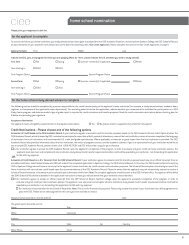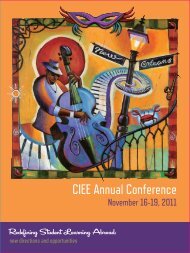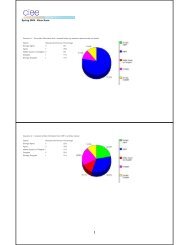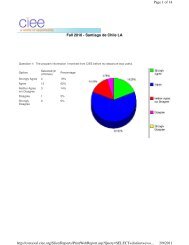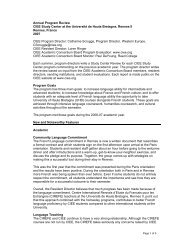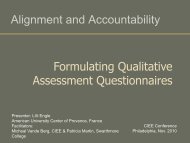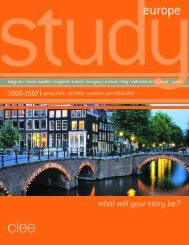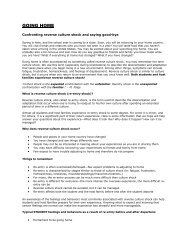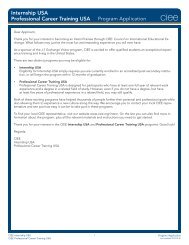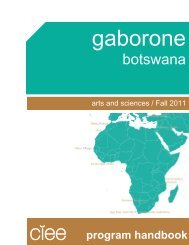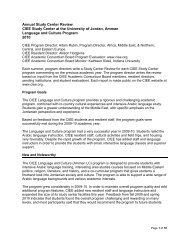Addressing the âStudyâ in Study Abroad
Addressing the âStudyâ in Study Abroad
Addressing the âStudyâ in Study Abroad
Create successful ePaper yourself
Turn your PDF publications into a flip-book with our unique Google optimized e-Paper software.
<strong>Address<strong>in</strong>g</strong> <strong>the</strong> “<strong>Study</strong>” <strong>in</strong> <strong>Study</strong> <strong>Abroad</strong><br />
Presenters:<br />
Jen Nielsen, Embassy of Australia<br />
Steve Ferst, The Education <strong>Abroad</strong> Network<br />
Daniela Ascarelli, Drexel University
Presentation outl<strong>in</strong>e<br />
• Overview of research study and results<br />
• Recommendations for host<strong>in</strong>g <strong>in</strong>stitutions<br />
• Recommendations for send<strong>in</strong>g <strong>in</strong>stitutions<br />
• Case study: Drexel University<br />
• Roundtable discussions<br />
• Group report<strong>in</strong>g and discussion
About <strong>the</strong> Australian Trade Commission<br />
• Austrade aims to <strong>in</strong>crease collaboration and student<br />
exchange between Australia and North America, and<br />
foster education and research l<strong>in</strong>kages and partnerships<br />
• Education specialists are based at <strong>the</strong> Embassy of<br />
Australia <strong>in</strong> Wash<strong>in</strong>gton, DC and <strong>the</strong> Australian High<br />
Commission <strong>in</strong> Toronto, ON
Background<br />
• Australian study abroad program<br />
• Extensive data collection on academic<br />
performance<br />
• Previous studies:<br />
• Merva, 2003: “Grades as Incentives”<br />
• Trooboof, Cressey & Monty, 2004:<br />
“Does study abroad grad<strong>in</strong>g motivate<br />
students?”
Research Question<br />
How do American students experience<br />
<strong>the</strong> academic environment of an<br />
Australian study abroad program?
Project Design<br />
• 11 students, July-Nov semester 2006<br />
• Self-selected, a variety of backgrounds<br />
• Mid-sized Australian urban university<br />
• 3 rounds of <strong>in</strong>terviews, open-ended<br />
questions
The results<br />
Studies as important Studies not a focus<br />
5: Highly engaged 2: Externally focused<br />
4: Engaged and perform<strong>in</strong>g 1: Disengaged<br />
3: Engaged but struggl<strong>in</strong>g
1. Disengaged<br />
“It‟s a three-hour lecture. I go, <strong>the</strong> professor talks and talks and<br />
talks. He doesn‟t make any sense and one time someone <strong>in</strong> our<br />
class even asked, „What‟s <strong>the</strong> po<strong>in</strong>t of this lecture?‟ And he<br />
said, „Oh I don‟t know,‟ and k<strong>in</strong>d of shrugged. So if <strong>the</strong><br />
professor doesn‟t even care about teach<strong>in</strong>g us anyth<strong>in</strong>g<br />
important, you know… There‟s a woman who lectures<br />
sometimes, and she‟s very good so I always go when she‟s<br />
speak<strong>in</strong>g, but usually I don‟t go. And most of my classes are<br />
just paper assessments so it‟s sort of po<strong>in</strong>tless to go to <strong>the</strong><br />
lectures.”<br />
- Megan<br />
“I th<strong>in</strong>k <strong>the</strong> university makes it really easy not to go to class.<br />
They almost encourage you not to go to class. Everyth<strong>in</strong>g‟s<br />
onl<strong>in</strong>e, you can read <strong>the</strong> lecture onl<strong>in</strong>e, you can listen to <strong>the</strong><br />
lectures onl<strong>in</strong>e. I‟ve never had that before.”<br />
- Benjam<strong>in</strong>
2. Externally focused<br />
“Priority of study? Travell<strong>in</strong>g is, really…., I can study at<br />
home. To be very honest with you, I did not come here to sit<br />
<strong>in</strong> my room and read. Good do<strong>in</strong>g <strong>the</strong> work and I foresee<br />
myself gett<strong>in</strong>g good grades. I‟m still putt<strong>in</strong>g <strong>in</strong> <strong>the</strong> effort but,<br />
I just… I don‟t know, <strong>the</strong>re needs to be a balance. But if I<br />
have to put it on a scale I‟d say that travell<strong>in</strong>g is… do<strong>in</strong>g<br />
th<strong>in</strong>gs I wouldn‟t get to do at home is, like, really important<br />
to me right now. That‟ll keep till I go back.”<br />
- Benjam<strong>in</strong><br />
“I‟m not really expect<strong>in</strong>g too much, I‟m just hop<strong>in</strong>g that I<br />
pass. I mean, with some courses, I really don‟t care if I<br />
pass because it‟s just be<strong>in</strong>g here and <strong>the</strong> experience is<br />
enough for me.”<br />
- Jessica
3. Engaged but struggl<strong>in</strong>g<br />
“There‟s also less class time itself. Back home it‟s like<br />
you have an hour and ten m<strong>in</strong>utes for Monday,<br />
Wednesday, Friday classes or an hour and fifty m<strong>in</strong>utes<br />
for Tuesday, Thursday classes, and so you‟re more<br />
regularly go<strong>in</strong>g to class. Whereas here, it‟s sort of like,<br />
okay my Mondays are dedicated to this class, my<br />
Tuesdays, I don‟t have any classes so that was k<strong>in</strong>d of<br />
weird. Wednesday is dedicated to an hour of this class,<br />
Thursday, you know, this class, Friday an hour of this<br />
class. And so it was a lot less regular, sort of.”<br />
- Amanda
3. Engaged but struggl<strong>in</strong>g<br />
“It‟s a stupid system. It‟s a very stupid system. And I<br />
understand it‟s for externals, it‟s for people who can‟t<br />
come to class. Well <strong>the</strong>n, don‟t make <strong>the</strong> lecture<br />
available to someone who could be <strong>in</strong> class. You know,<br />
I don‟t understand. And you know, I‟ve missed like two<br />
classes <strong>the</strong> whole semester… and I‟ll probably be<br />
graded <strong>the</strong> same way as someone who has missed<br />
15%. As long as you don‟t exceed <strong>the</strong> limit, you‟re<br />
graded <strong>the</strong> same way as someone who is <strong>in</strong> class 100%<br />
of <strong>the</strong> time and that‟s not very reasonable.”<br />
- Benjam<strong>in</strong>
3. Engaged but struggl<strong>in</strong>g<br />
“I have a paper next week that I‟m turn<strong>in</strong>g <strong>in</strong> that‟s 20 percent of<br />
my grade, you know, and I was talk<strong>in</strong>g with a few people <strong>in</strong> <strong>the</strong><br />
class before <strong>the</strong> teacher showed up. Half of <strong>the</strong>m were<br />
American and half were Australian and I was like, “Geez, you<br />
know, it‟s a 20 percent paper. Christ, how am I supposed to<br />
write this? This is 20 percent of my grade. And <strong>the</strong> Americans<br />
are like pull<strong>in</strong>g out <strong>the</strong>ir hair, <strong>the</strong>y‟re like, “What are we go<strong>in</strong>g to<br />
do?” And <strong>the</strong> Australians are like, “20 percent of your grade!<br />
That‟s noth<strong>in</strong>g.” And I‟m like, “What‟s wrong with <strong>the</strong>m? Of<br />
course it is.”<br />
- Jonathan<br />
“I have two exams, one of <strong>the</strong>m really is stress<strong>in</strong>g me out. It‟s 60<br />
percent of my grade, which for me is m<strong>in</strong>d-boggl<strong>in</strong>g and it‟s<br />
completely multiple choice, which, not just from a student<br />
standpo<strong>in</strong>t you know, is like really sucky….” - Amanda
4. Engaged and perform<strong>in</strong>g<br />
“It‟s different from at home because it seems like <strong>the</strong>re are<br />
fewer assignments, but those assignments are harder and<br />
require more research. So I can‟t say it‟s a heavier workload<br />
but it is a more concentrated workload, when I do it.”<br />
- Andrew<br />
“…it‟s read<strong>in</strong>g so, you know, I like to th<strong>in</strong>k that read<strong>in</strong>g is an<br />
easy version of homework, you know. My version of homework<br />
<strong>in</strong> my head is always equations, math book, problems one<br />
through 20, you know, someth<strong>in</strong>g like that. It‟s not like that, it‟s<br />
just really…and that‟s fun, you know.”<br />
- Jonathan
5. Highly engaged<br />
“I th<strong>in</strong>k <strong>the</strong>re‟s a difference <strong>in</strong> how we teach history, because we‟re<br />
<strong>the</strong>matic back home whereas here it‟s subject oriented… I th<strong>in</strong>k<br />
that‟s generally all over <strong>the</strong> world that‟s how <strong>the</strong>y‟re chang<strong>in</strong>g <strong>the</strong><br />
subject and so history is different…as people learn how people<br />
learn, <strong>the</strong>y‟re chang<strong>in</strong>g it. I th<strong>in</strong>k it‟s go<strong>in</strong>g to be different for<br />
everybody, but ours is <strong>the</strong>matic back home, so a different read<strong>in</strong>g<br />
situation…”<br />
“I love my education so, like, I love all of my classes this semester.<br />
And I‟ve been tell<strong>in</strong>g my parents, „Oh, I love my academics way<br />
better this semester than last semester‟ and I love, I like that fact<br />
that I‟m start<strong>in</strong>g to work at a museum „cuz that‟s what I was do<strong>in</strong>g<br />
back at home. I was volunteer<strong>in</strong>g and that k<strong>in</strong>d of th<strong>in</strong>g. I‟m gett<strong>in</strong>g<br />
k<strong>in</strong>d of back <strong>in</strong>to what I did at home…” - Sarah
Academic Results<br />
Rank<br />
Before<br />
Rank<br />
After<br />
Type GPA In GPA Out Category<br />
1 2 Private 3.7 3.33 4<br />
2 1 State 3.69 3.67 5<br />
3 7 Private 3.67 2.25 2<br />
4 6 State 3.65 2.33 2<br />
5 5 Private 3.47 2.5 3<br />
6 11 Private 3.21 0.5 1<br />
7 10 State 3.2 1.33 3<br />
8 4 State 3.05 3.25 5<br />
9 9 State 2.48 1.55 3<br />
10 8 Private 2.75 1.91 3<br />
11 2 Private 2.46 3.33 4
Recommendations<br />
Pre-departure<br />
• Faculty-student relationships<br />
• The <strong>in</strong>formality of <strong>the</strong> Australian university<br />
environment and appropriate <strong>in</strong>terpretation<br />
• Teach<strong>in</strong>g/learn<strong>in</strong>g philosophy, <strong>in</strong>clud<strong>in</strong>g <strong>the</strong><br />
focus on assessment tasks not classroom<br />
participation, and <strong>in</strong>dependent learn<strong>in</strong>g<br />
• Samples of timetables, course structures and<br />
assessment tasks
Recommendations<br />
Orientation<br />
• Workshops by Australian faculty<br />
• Discipl<strong>in</strong>e-specific workshops<br />
• Library 101 –undertak<strong>in</strong>g <strong>in</strong>dependent<br />
research<br />
• Tools for success – balanc<strong>in</strong>g study and <strong>the</strong><br />
outside temptations, time-management,<br />
goal-sett<strong>in</strong>g
Recommendations<br />
Throughout <strong>the</strong> semester<br />
• Workshops relevant to workload dur<strong>in</strong>g<br />
semester<br />
• Peer mentors<br />
• Greater assistance from faculty and<br />
student support staff to understand<br />
common problems & provide relevant<br />
answers and support
Contact us<br />
Leadership team<br />
Alison McGuigan-Lewis<br />
Senior Trade Commissioner, USA<br />
alison.mcguiganlewis@austrade.gov.au<br />
Ph: +1 202 797 3093<br />
Brendhan Egan<br />
Trade Commissioner, USA<br />
brendhan.egan@austrade.gov.au<br />
Ph: +1 202 797 3398<br />
Stefan Trofimovs<br />
Trade Commissioner, Canada<br />
stefan.trofimovs@austrade.gov.au<br />
Ph: +1 416 323 4281<br />
Education team<br />
Jen Nielsen<br />
Education Manager – North America<br />
jen.nielsen@austrade.gov.au<br />
Ph: +1 202 797 3028<br />
Sarah Wolf<br />
Education Manager – North America<br />
sarah.wolf@austrade.gov.au<br />
Ph: +1 202 797 3478<br />
Jenny Venecek<br />
Assistant Education Manager<br />
jennifer.venecek@austrade.gov.au<br />
Ph: +1 202 797 3389<br />
Fareeda Chand<br />
Senior Director – Market<strong>in</strong>g<br />
fareeda.chand@austrade.gov.au<br />
Ph: +1 416 323 4284
Academic Engagement <strong>in</strong><br />
Learn<strong>in</strong>g <strong>Abroad</strong><br />
Prepar<strong>in</strong>g for Success<br />
Stephen Ferst
Potts‟ Taxonomy<br />
• Disengaged<br />
• Externally Focused<br />
• Engaged but Struggl<strong>in</strong>g<br />
• Engaged and Perform<strong>in</strong>g<br />
• Highly Engaged
Two Academic Populations<br />
Well Prepared<br />
Under Prepared
Two Academic Populations<br />
Well Prepared<br />
Under Prepared<br />
• Engaged and<br />
Perform<strong>in</strong>g<br />
• Highly Engaged<br />
• Disengaged<br />
• Externally Focused<br />
• Engaged but<br />
Struggl<strong>in</strong>g
Case Studies<br />
• Informal research tells <strong>the</strong> same story<br />
• Location and Language are factors<br />
• Type of program is a factor
Type of Program<br />
• Free Stand<strong>in</strong>g or Island programs<br />
– Allows for familiar academic sett<strong>in</strong>g<br />
– Allows for tighter curricular <strong>in</strong>tegration<br />
• Students tend to<br />
match academic<br />
achievement at<br />
home
Type of Program<br />
• Field Based programs<br />
– Typically unfamiliar<br />
academic learn<strong>in</strong>g<br />
sett<strong>in</strong>g<br />
– Allows for tighter<br />
curricular <strong>in</strong>tegration<br />
– But generally with US<br />
faculty so structure is<br />
generally similar<br />
• Students tend to match achievement at home
Type of Program<br />
• Full Integration programs<br />
– Allows for new academic sett<strong>in</strong>g<br />
– Allows for greater variety <strong>in</strong> coursework<br />
• Students tend to be close to academic<br />
achievement at home but it varies along<br />
<strong>the</strong> Potts‟ divisions.
Under-prepared Students<br />
• What do we know?<br />
• What can we do to help?
Multicultural Learn<strong>in</strong>g<br />
• We know about teach<strong>in</strong>g to different<br />
cultures:<br />
– “Learn<strong>in</strong>g Styles, Culture and Inclusive<br />
Instruction <strong>in</strong> <strong>the</strong> Multicultural Classroom”<br />
Glauco De Vita, May 2001<br />
– “Learn<strong>in</strong>g Styles and Culturally Diverse<br />
Students” Irv<strong>in</strong>e and York, 1995
Learn<strong>in</strong>g <strong>in</strong> Different Cultures<br />
• Multi-Cultural Teach<strong>in</strong>g is different than<br />
Multi-Cultural Learn<strong>in</strong>g<br />
– Multi-Cultural Teach<strong>in</strong>g is about adapt<strong>in</strong>g to<br />
<strong>the</strong> learner.<br />
– Multi-Cultural Learn<strong>in</strong>g is about <strong>the</strong> learner<br />
adapt<strong>in</strong>g to <strong>the</strong> teach<strong>in</strong>g style.
Foreign Students <strong>in</strong> Australia<br />
• <strong>Study</strong> of students from Malaysia, Ch<strong>in</strong>a,<br />
and Hong Kong study<strong>in</strong>g <strong>in</strong> Australia<br />
– Volet, Simone. Learn<strong>in</strong>g across Cultures:<br />
Appropriateness of Knowledge Transfer. 1999
Culture & Learn<strong>in</strong>g Potential<br />
The cultural dimensions<br />
are critical <strong>in</strong> determ<strong>in</strong><strong>in</strong>g<br />
what are appropriate<br />
forms of learn<strong>in</strong>g as well<br />
as <strong>in</strong> realiz<strong>in</strong>g <strong>the</strong> learn<strong>in</strong>g<br />
potential of <strong>in</strong>dividuals
Our Current Assumptions<br />
Implicit assumption that <strong>the</strong> process of<br />
enculturation <strong>in</strong> a new community is<br />
ma<strong>in</strong>ly a cognitive<br />
and social affair.
What should we focus on?<br />
The focus should be on perceptions of<br />
learn<strong>in</strong>g <strong>in</strong> <strong>the</strong> home and <strong>the</strong> host country.
Indicators of Success<br />
• Deep approach to learn<strong>in</strong>g<br />
• Informal peer support groups<br />
• Diligence at cue-seek<strong>in</strong>g <strong>in</strong> order to conform<br />
to task requirements<br />
• Realistic expectations regard<strong>in</strong>g learn<strong>in</strong>g<br />
and <strong>in</strong>struction, seek<strong>in</strong>g help from teachers<br />
dur<strong>in</strong>g class, and low participation <strong>in</strong> tutorial<br />
discussions
Where to go from here?<br />
• We need to take an approach that<br />
prepares students to study <strong>in</strong> <strong>the</strong> location<br />
to which we are send<strong>in</strong>g <strong>the</strong>m.<br />
• A careful look at <strong>the</strong> style of teach<strong>in</strong>g is<br />
relevant and important for success of<br />
Potts‟ low-engagement groups.
Drexel University<br />
• Located <strong>in</strong> Philadelphia, PA<br />
• One of <strong>the</strong> premier co-op <strong>in</strong>stitutions <strong>in</strong> <strong>the</strong> US<br />
• Offers a variety of study abroad program models<br />
<strong>in</strong>clud<strong>in</strong>g full <strong>in</strong>tegration, island programs, hybrid<br />
programs, short term study tours...<br />
• Programs vary <strong>in</strong> length from one week to a full<br />
academic year and can be study only or study+co-op.
What are students study<strong>in</strong>g while<br />
abroad?<br />
• Specific content– ie th<strong>in</strong>gs that cannot be<br />
learned at home?<br />
• Culture/language of <strong>the</strong> host country?<br />
• Self- awareness <strong>in</strong> relation to global<br />
awareness?<br />
• Someth<strong>in</strong>g else?
Bioko Island, Equatorial Gu<strong>in</strong>ea<br />
Students study Bio Conservation and Environmental<br />
studies <strong>in</strong> Equatorial Gu<strong>in</strong>ea <strong>in</strong> West Africa<br />
• Research based program– unique location, unique topic<br />
• Students are taught by both US and host country<br />
<strong>in</strong>structors<br />
• US <strong>in</strong>structor of capstone research courses beg<strong>in</strong>s<br />
contact<strong>in</strong>g students approx one month before<br />
departure<br />
• Students are required to present research f<strong>in</strong>d<strong>in</strong>gs to<br />
local dignitaries at end of program
Bioko Island, Equatorial Gu<strong>in</strong>ea<br />
Program provides students with:<br />
The opportunity to take on<br />
<strong>in</strong>dividual research programs.<br />
The opportunity to take<br />
coursework that is not available <strong>in</strong><br />
<strong>the</strong> US<br />
• The opportunity to experience liv<strong>in</strong>g <strong>in</strong> a different<br />
culture<br />
• The opportunity to beg<strong>in</strong> to understand <strong>the</strong><br />
complex role oil companies play <strong>in</strong> oil rich nations
Exchange program <strong>in</strong><br />
Taiwan<br />
• Program provides students<br />
<strong>the</strong> opportunity to<br />
– Focus on language and culture acquisition as well<br />
as personal awareness<br />
– To be enrolled <strong>in</strong> host <strong>in</strong>stitution but take courses<br />
created for Drexel students<br />
– To take courses taught by local faculty<br />
– Be paired with host students for language study
Exchange program <strong>in</strong> Taiwan<br />
• Students take course entitled “Cross<strong>in</strong>g <strong>the</strong><br />
Bridge”<br />
– Taught on l<strong>in</strong>e by Drexel faculty member<br />
– Faculty member goes to Taiwan for 10 days of<br />
<strong>in</strong>tensive on site work with students<br />
• Deliberate attempt to “help students to enhance<br />
<strong>the</strong>ir <strong>in</strong>tercultural competence by develop<strong>in</strong>g a<br />
different lens through which to view <strong>the</strong> world,<br />
and by generat<strong>in</strong>g a project which will tie <strong>the</strong><br />
<strong>in</strong>tercultural experience to a present or future<br />
goal (a tangible project which can be shared with<br />
family, friends or future employers). “
Drexel <strong>in</strong> Iceland<br />
• Iceland Design and Merchandis<strong>in</strong>g week<br />
– Students take a course before and after spr<strong>in</strong>g<br />
break trip<br />
– Purpose of trip is for on-site research on design<br />
and merchandis<strong>in</strong>g <strong>in</strong> Iceland<br />
– Post trip course focuses on syn<strong>the</strong>siz<strong>in</strong>g research<br />
done while overseas
Course of opportunity: Drexel <strong>in</strong><br />
Shanghai: World’s Fair<br />
• Shanghai World’s Fair<br />
– Open to students enrolled <strong>in</strong><br />
regular summer course<br />
– Focus of program is for<br />
students to move from<br />
<strong>the</strong>ories about world fairs to<br />
reality<br />
– Past courses have <strong>in</strong>cluded<br />
FIFA World Cup <strong>in</strong> S. Africa<br />
– Course be<strong>in</strong>g planned for<br />
2012 Olympics
Th<strong>in</strong>gs to th<strong>in</strong>k about<br />
• Better def<strong>in</strong>e what <strong>the</strong> purpose of program is and be more<br />
deliberate <strong>in</strong> l<strong>in</strong>k<strong>in</strong>g program design/assessment to this<br />
goal<br />
– Is your program a language immersion program?<br />
– Is <strong>the</strong> program aimed at replicat<strong>in</strong>g home school courses <strong>in</strong> a<br />
different academic sett<strong>in</strong>g?<br />
– Is <strong>the</strong> goal of <strong>the</strong> program for students to take coursework<br />
unavailable at home?<br />
– Someth<strong>in</strong>g else?<br />
• Create courses that are explicit pathways for students to<br />
achieve this goal<br />
• Be realistic– it is very unlikely that one program can do all<br />
th<strong>in</strong>gs, ie provide language acquisition, deep cultural<br />
knowledge, <strong>in</strong>creased self awareness, <strong>in</strong>tercultural<br />
superstars…
Questions to Consider<br />
1. What are you do<strong>in</strong>g on your campus/at your study abroad site to<br />
prepare students for <strong>the</strong> academic experience <strong>the</strong>y are about to<br />
have abroad?<br />
2. How much time do students with whom you work spend th<strong>in</strong>k<strong>in</strong>g<br />
about <strong>the</strong> academic system <strong>the</strong>y are go<strong>in</strong>g to enter?<br />
3. What strategies do you have for putt<strong>in</strong>g <strong>the</strong> “study” back <strong>in</strong> study<br />
abroad?<br />
4. How <strong>in</strong>tegrated is your <strong>in</strong>stitution‟s study abroad program with its<br />
academic programm<strong>in</strong>g?<br />
5. How relevant to a student‟s college education is all of <strong>the</strong> extracurricular<br />
activity that takes place on study abroad?<br />
6. Which locations are easiest for your students to assimilate <strong>in</strong>to, and<br />
why?
1. Academic Preparation<br />
• What are you do<strong>in</strong>g on your campus/at your study abroad<br />
site to prepare students for <strong>the</strong> academic experience <strong>the</strong>y<br />
are about to have abroad?<br />
• Most orientation not focussed on academic<br />
• Connect<strong>in</strong> students with exchange students already on campus –<br />
sett<strong>in</strong>g up time to talk, discuss topics, <strong>in</strong>clude discussion on<br />
differences <strong>in</strong> academic systems, ask what to expect to study.<br />
• Ask students to request syllabi from courses (to get approved) –<br />
have <strong>the</strong>y read it? Ask <strong>the</strong>m to digest it, answer some questions,<br />
go through and ask how much time to do an assignment, read<strong>in</strong>g,<br />
etc. to prepare and set expectations on how much work <strong>the</strong><br />
course will be
2. Education System<br />
• How much time do students spend th<strong>in</strong>k<strong>in</strong>g about <strong>the</strong><br />
academic system <strong>the</strong>y are go<strong>in</strong>g to enter?<br />
• Not a lot. When it looks like <strong>the</strong> American system, looks like it‟s<br />
all <strong>the</strong> same.
3. Strategies<br />
• What strategies do you have for putt<strong>in</strong>g <strong>the</strong> “study” back <strong>in</strong><br />
study abroad?<br />
• Small liberal arts – faculty led, not so much an issue<br />
• <strong>Study</strong> abroad focus only focus on study – what are academics<br />
like, less time on travel because students will do that on <strong>the</strong>ir<br />
own. Constantly focuss<strong>in</strong>g back<br />
• Eng<strong>in</strong>eers – difficult not to study. Some is major-specific<br />
• <strong>Study</strong> is up to <strong>the</strong> student to a certa<strong>in</strong> degree – how <strong>the</strong>y want<br />
to <strong>in</strong>terpret is <strong>the</strong>ir choice
4. Academic <strong>in</strong>tegration<br />
• How <strong>in</strong>tegrated is your <strong>in</strong>stitution’s study abroad program<br />
with its academic programm<strong>in</strong>g?<br />
• Responses:
5. Extra-Curricular Activity<br />
• How relevant to a student’s college education is all of <strong>the</strong><br />
extra-curricular activity that takes place on study abroad?<br />
• Imporance of how we present extra-curricular – use “cocurricular”,<br />
not trips<br />
• Break down divisions between <strong>the</strong>se activities<br />
• There‟s learn<strong>in</strong>g that occurs <strong>in</strong> and out of <strong>the</strong> classroom –<br />
mak<strong>in</strong>g it more <strong>in</strong>tentional help<strong>in</strong>g students make connections<br />
between how and what students are learn<strong>in</strong>g<br />
• Cont<strong>in</strong>ued engagement with students pre-, dur<strong>in</strong>g and post-,<br />
whe<strong>the</strong>r it‟s an onl<strong>in</strong>e course or program
6. Academic Assimilation<br />
• Which locations are easiest for your students to<br />
assimilate <strong>in</strong>to, and why?<br />
• Sometimes <strong>the</strong> more similar, <strong>the</strong> harder it is to assimilate<br />
(<strong>the</strong>y assume it‟s <strong>the</strong> same and don‟t adjust)<br />
• Seems that students feel more comfortable <strong>in</strong> faculty-led and<br />
island programs ra<strong>the</strong>r than direct enrol




